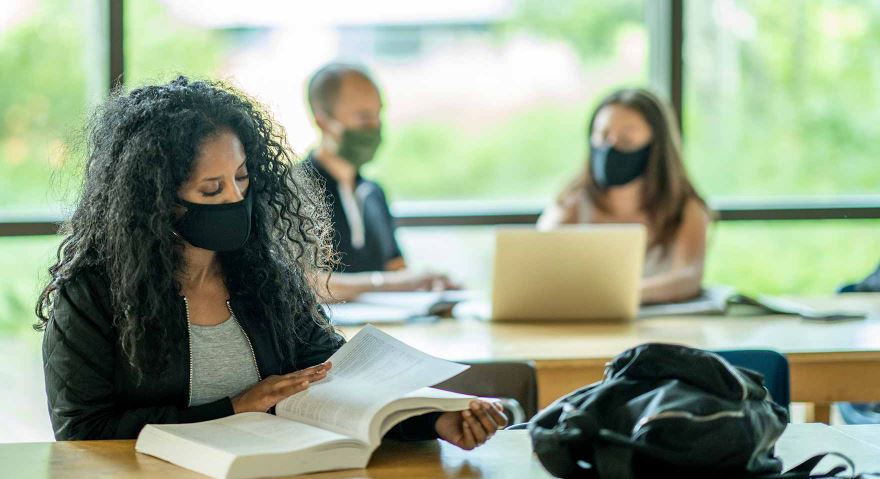The Impact of COVID-19 on College Students
The Impact of COVID-19 on College Students – Understanding the implications of the COVID-19 pandemic in a global society is critical as it founds preparation for potential health crises. The pandemic resulted in a critical death rate internationally, which has had detrimental effects on relatives’ psychological well-being (Coughenour et al., 2020).
Second, with the infection rates requiring expensive treatment facilities and resources, destabilization of the global public health sector was apparent. Furthermore, the pandemic altered nations’ economies by distorting employment, ultimately inducing people to low living standards, resulting in trauma and depression (World Health Organization, 2021). Such impacts are practical and evident in society at large, including college students.
Researchers have documented the social, economic, and psychological implications of COVID-19 in society. According to Chriscaden (2020), the pandemic increased poverty rates, raising the number of undernourished people by 132 million individuals.
Such statistics imply that the population suffering poverty-induced mental instability significantly increased with the pandemic. With over 1.8 million deaths globally by the end of 2020 for only countries that can quantify the cases effectively, the social and psychological impacts of the COVID-19 pandemic are inarguable (World Health Organization, 2021).
Overall, whether social, economic, or mental implications of the pandemic, the apparent harmful implications in the global community, at all ages, races, ethnic groups, and other social classes.
Specifically, college students should understand how the pandemic affected their social, economic, and psychological welfare to relate effectively and understand how their situations matched the practical health crisis implications. Such research offers the fundamental data and information to spur awareness and attention on the need to focus on college students when health crises occur.
According to World Health Organization (2021), the impacts of the pandemic on the global education system have had a deleterious implication on learners. Therefore, as nations focus on restoring the vulnerable population’s well-being, college students should not be excluded.
College students significantly suffered the pinche of the COVID-19 pandemic considering the social, economic, and political elements surrounding the health crisis. When the World Health Organization (WHO) pronounced the pandemic as a global health crisis, national governments had to take stringent measures to curb the infection spread, including barring physical and interactive classes in colleges.
Such a move distorted the higher learning bussing culture and proximity, inducing learners to critical psychological challenges. College students who were on internships lost their livelihoods, predisposing them to hard financial situations.
The death of relatives and friends due to the critical nature of the COVID-19 infections also pushed college students to hard life situations characterized by psychological and mental instability.
Therefore, although society might not focus on the college students significantly, they form a key group of individuals who suffered the pinches of the COVID-19 pandemic.
Literature Review
Researchers have exploratively studied the impacts of the COVID-19 pandemic on college students. With the practical effects of the pandemic on human health, including the substantial death rate, and the stay-at-home order in the United States (US), scholars have concluded significant implications in different research journals. Coughenour et al. (2020) and Lee et al. (2021) are among the key researchers exploring the pandemic’s implications on US college students.
Coughenour et al. (2020) explore the correlation between the stay-at-home order, learners’ involvement in physical activity at home, and psychological welfare. Their findings highlight that the pandemic had substantive negative effects on college students’ physical activities and psychological well-being.
Such inference implies that the indoor stay at home reduced the students’ involvement in physical exercises, which integrated with such other factors as the deaths of relatives and friends to contribute to stress and depression.
Also, the journal article concludes that non-American college students suffered more than American learners during the pandemic. Such inference implies that parents, guardians, the government, and the education fraternity should significantly focus on the students of color when health crises occur.
Impact of COVID-19 and Psychological implications
Lee et al. (2021) explores the social and psychological implications of the pandemic on US college students. The authors conclude that the pandemic significantly distorted the college students’ psychological welfare by minimizing physical interactions.
With the barn of physical classes and the indoor lifestyle, students had unreliable social interactions that augmented stress and depression. Ideally, the pandemic distorted the learners’ social life, inducing them to psychological instability. Also, the journal article highlights no significant social differences in the impacts of the COVID-19 pandemic. Such inferences oppose the common expectation that such groups like the LGBTQ+ and non-white students suffered many more challenges than the American students.
While the two research articles focus on different elements regarding the impacts of the pandemic on US college students, social versus psychological, they both posit critical alteration of mental welfare. For Coughenour et al. (2020), failure to engage substantially in physical activities during the pandemic and other social and economic conditions alter the students’ mental welfare.
Similarly, Lee et al. (2021) denote that the socioeconomic implications of the pandemic played a critical role in triggering depression and stress among college students. Both articles present practical arguments because inadequate engagement in physical activity, unreliable social interactions, loss of family members, and financial strains, to mention a few factors, would disrupt mental well-being.
Therefore, both articles reinforce damaging factual implications of COVID-pandemic on college students, recommending future comprehensive research to explore the subjects. However, the articles differ in defining the social variation of the pandemic implications on various social groups, including the blacks and the LGBTQ+ community.
Although Coughenour et al. (2020) infer significant differences of implications relating to sexual orientation, Lee et al. (2021) findings indicate no significant differences in any social group. Although the opposing inferences from both research works might be confusing, the differences in focus might have caused the diverse conclusions.
Notably, the often-societal discriminated groups, including the LGBTQ+ community and the blacks, might have perceived the indoor stay as an opportunity to evade stigmatization, hence evading outdoor physical engagements. Contrary, Lee et al. (2021) emphasize that the presence of strong organizations and groups supporting the minority groups provided reliable support during the pandemic, minimizing psychological breakdown among member college students. Therefore, the evident differences between the two articles are due to focus, which is normal in research studies.
Conclusion
In a nutshell, the COVID-19 pandemic is a fundamental health crisis, and its implications affect every member of society, including college students. Coughenour et al. (2020) and Lee et al. (2021) prove that the epidemic had deleterious impacts on college students’ welfare.
With alteration on learners’ social, economic, and psychological welfare, destabilization of individuals’ welfare was apparent. Such a fact requires the education sector and the global public health system to prepare adequately for future health crises and consider college students’ mental well-being as a key aspect. Researchers are also stakeholders as they will help offer objective findings, which are vital in initiating evidence-based strategies.
Further research should encompass the potential sustainable solutions to safeguard college students’ mental well-being during such health crises. Notably, after learning the practical existence of a social problem, the next step must be seeking a solution. The key lesson from the available research is that the community must find effective strategies to respond to future pandemics.
The need for an effectively coordinated integrative global health sector to handle future health crises in groups, including college learners, is inarguable. Therefore, besides the vital implications of the COVID-19 pandemic on students’ psychological and mental welfare, education and community stakeholders can prepare adequately to counter future destabilization.
References
Chriscaden, K. (2020). Impact of COVID-19 on people’s livelihoods, their health, and our food systems.
Coughenour, C., Gakh, M., Pharr, J. R., Bungum, T., & Jalene, S. (2020). Changes in depression and physical activity among college students on a diverse campus after a COVID-19 stay-at-home order.
Lee, J., Solomon, M., Stead, T., Kwon, B., & Ganti, L. (2021). Impact of COVID-19 on the mental health of US college students. BMC
World Health Organization. (2021). The impact of COVID-19 on global health goals.
Relevant Academic Articles and Posts
Global Impact of COVID-19 on the Balance of Economic and Political Power
Psychology Dissertation Topics
If you enjoyed reading this post on the impact of COVID-19 on college students, I would be very grateful if you could help spread this knowledge by emailing this post to a friend, or sharing it on Twitter or Facebook. Thank you


